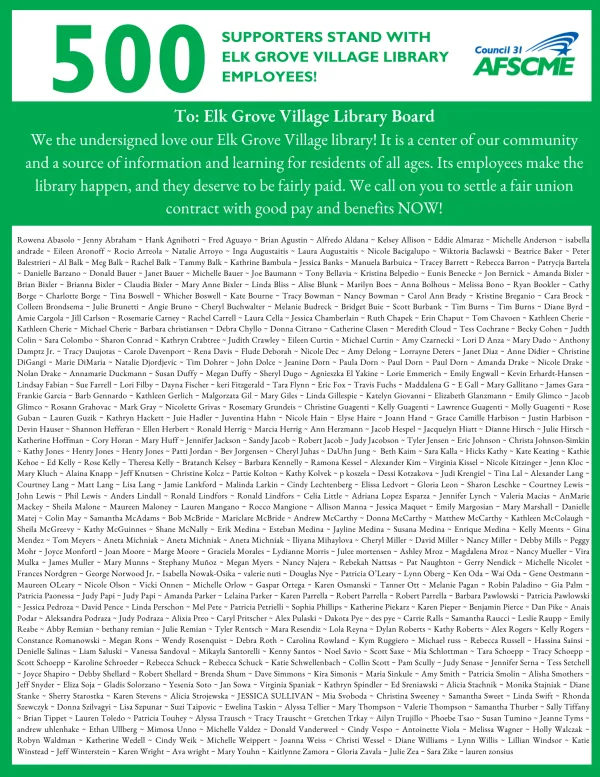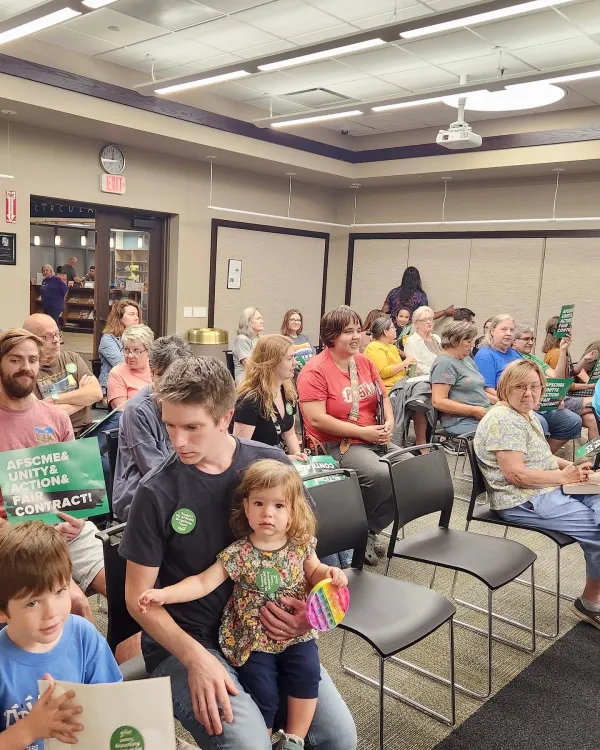Elk Grove library workers win with help of community
 |
| The petition was signed by more than 500 community supporters. |
When the members of AFSCME Local 3783 at the Elk Grove Village Public Library sent their union bargaining committee into negotiations with management in March, they were aiming high.
“Our biggest goal was definitely wages, reflecting inflation and rising costs so our members could provide for themselves and their families,” says Alexandra Podraza. A youth services librarian for the past 10 years, she’s also the local’s recording secretary.
In addition, Podraza says, they hoped to win more parental leave, and to level the playing field for members working part-time as library pages—a position that management “really treated as second-class citizens.”
“Everybody else in the library builds up sick time and vacation time based on seniority. We only had what was called ‘page benefit time’, and it took forever to build anything up. I’d work a couple months to even get one shift off,” says Sue Piltaver, a retired teacher with a decade of service as a page.
Also, “the page salary schedule stopped at year 6. Everyone else went to year 20. It wasn’t fair. We may be ‘just pages’, but we’re important to the library. I’m a team player, I go 110 percent. And just because we’re pages doesn’t mean we’re not people.”
Led by AFSCME Council 31 staff representative Colin Theis, the bargaining committee of Podraza, local President Jan Chrzan, Vice President Josh Fulkerson, and Dorothy Aguayo knew that achieving these aims wouldn’t be easy.
Sure enough, Podraza admits, “It was a tough fight to get the big-ticket items we wanted.”
How’d they do it?
“It took a lot more member involvement,” Podraza says. “We had to reach out to our members to show up at [library board] meetings. Members wrote letters to the board describing what it’s like living on the wages they were paid.”
They reached out to the community, too, gathering names of supporters that they delivered to the board.
“We asked the public to sign a petition supporting us, and in a really short amount of time we got more than 500 signatures,” Podraza says. “It was heartwarming, knowing so many people signed it, and their comments brought tears to my eyes. We even had community members speak to the board.”
“Our library is successful because these folks work hard,” one petition signer wrote.
“Their dedication deserves to be recognized and rewarded,” another added.
“Promptly resolve this contract with a generous offer to these wonderful workers who serve us with professionalism,” yet another signer urged, pointedly asking the board, “What is preventing you from doing this?”
“When you take it out and start spreading the word in the community, that’s huge. Now it’s not just an inside discussion,” Piltaver says. It’s a credit to “all the relationships that employees build. We greet people when they come in, we make them feel welcome, and those relationships are important to the community and to us as a library.”
The bargaining team saw how the widespread member involvement and public support moved management.
“It gave them something to think about,” Podraza says.“They were concerned and wondering what we would do next, and their attitudes did change. I think the board saw us more as people.”
Changing management’s mindset yielded agreement on a four-year contract that raises base wages by 15%, adds a longevity bonus at 20 years of service, doubles parental leave from two weeks to four, and gives everyone in the unit another floating holiday.
 |
| Members of Local 3783 pack a library board meeting. |
Not least, the local also won fairer treatment for pages, including sick and vacation time, added steps on the pay scale and improved overtime pay.
“They made a lot of nice strides for us—not baby steps but big steps,” Piltaver says. “Percentage increase, added steps, accrual of sick and vacation time—I couldn’t believe it. The gains we made are just tremendous. I never thought we’d get all this in one contract.”
“We’ve been fighting for more than a decade for more equal wages and benefits for pages, so that really is a big one,” Podraza says.
The ratification vote was unanimous.
Bottom line, Podraza says, “A lot of credit has to go to our members. Our committee alone wouldn’t have been enough. Our members needed to come together to drum up support—reaching out to family, friends and the community—and they did.”
